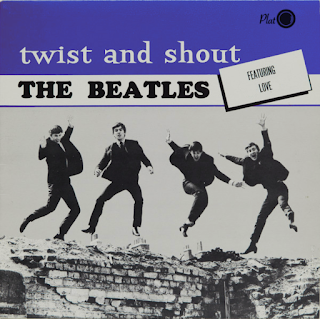The Beatles' Third Album (June, 1964, Timaeus)
< file under Beatles In Atlantis >
~ an approximation of this album, using latest remasters, can be heard here on Apple Music ~
The good times continued in Atlantis; the leadership was keeping promises to the people, the dreams of the nation were taking shape, and the good relations with the surface world flourished. 1964 felt like the least troubled. most optimistic year in the collective memory of the young populace of this fabled realm.
Over at EMI's local outpost, though, Tivowr Dorna had a bit of concern about how to maintain The Beatles' remarkable undersea momentum. A Second Time was an even bigger hit than Twist and Shout, and under Dorna's supervision and courtesy of his connections in the UK and now the US, BBC Beatles performances were flooding the waterwaves of Atlantis radio and the quartet's Ed Sullivan TV appearances beamed into homes across the country.
But, thinking perhaps he'd expected a bit too much output too quickly from the Lennon/McCartney songwriting duo — seeing as how he'd placed more Beatles originals on their second album than had even appeared on a single UK album to date — Dorna faced what he considered an obstacle in crafting the next Beatles Atlantis release. He had only four unused originals, one of which had already been released by Billy J. Kramer with the Dakotas, the other by The Rolling Stones — with both making the charts, the latter launching the Stones' successful Atlantis sixties — to build an LP around.
Dorna was concerned enough about the prospects of such a release that he considered going to EMI and suggesting it be released on Timaeus' budget label counterpart, Critias. He decided that might do more harm than good to the album's sales, and to the band's longterm prospects.
To bolster the LP's chances, he chose to open and close the album with the two German sides the band had recorded. These may have been seen as odd novelties when they appeared in the US. In Atlantis, however, where the people had always been polyglots, The Beatles taking the time to record in another language was celebrated. The average Atlantean is said to have spoken at least six languages other than their own. With East Germany one of the Eastern Bloc nations with which Atlantis was developing the most diplomatic relations, and with West Germany having built a recent history a strong trade and cultural exchanges with Atlantis, German had grown into one of the more popular surface tongues. Additionally, in this stereo-obsessed nation, Sie liebt dich held a special appeal, as the English She Loves You was mono-only.
To augment the four English Lennon/McCartney numbers, and the two earlier gems rerecorded in German, Dorna relied on what he described on the back cover as "fab covers of some of the lads' most rocking and fervent favorites." The resultant release was in this regard not so different from the second Capitol US album which bore a similar name. Any similarity though is apparently a coincidence. EMI notes, and messages back to George Martin, clearly indicate Dorna had the majority of songs selected, and the album title chosen, well ahead of the release of the American compilation.
Like that similarly titled American LP, this one featured a good number of tracks left over from the band's excellent second UK LP; unlike that album, this release also included the entirety of the band's fifth UK EP.
Donna's initial concerns, largely allayed when he became aware of the German recordings, were unfounded. The Beatles' Third Album was beloved by the band's growing Atlantis fanbase, who turned it into another smash chart-topper.
 |
| Despite a paucity of new originals, the third LP was a smash |
1. Komm, Gib Mir Deine Hand °
2. This Boy ‡3. Roll Over Beethoven †4. Please Mr. Postman †5. Matchbox ^6. Long Tall Sally [mono] ∞7. I Call Your Name [mono] ∞
1. Slow Down ^2. Devil in Her Heart †3. Money †4. I Wanna Be Your Man *5. Hold Me Tight *6. You Really Got a Hold on Me †7. Sie Liebt Dich π

